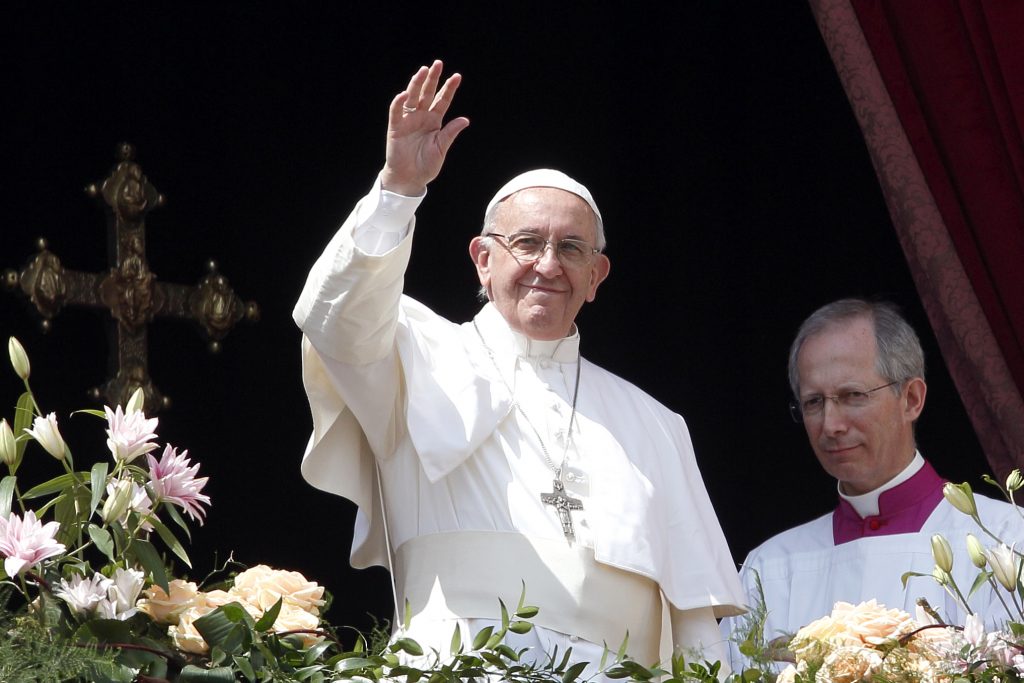
By Cindy Wooden and Junno Arocho Esteves
Jesus is the risen shepherd who takes upon his shoulders “our brothers and sisters crushed by evil in all its varied forms,” Pope Francis said before giving his solemn Easter blessing on 16 April at St Peter’s Square.
With tens of thousands of people gathered at the square, the Pope called on Christians to be instruments of Christ’s outreach to refugees and migrants, victims of war and exploitation, famine and loneliness.
For the 30th year in a row, Dutch farmers and florists blanketed the area around the altar with grass and 35,000 flowers and plants – lilies, roses, tulips, hyacinths, daffodils, birch and linden.
Preaching without a prepared text, Pope Francis began as he did the night before at the Easter Vigil imagining the disciples desolate because “the one they loved so much was executed. He died.”
While they are huddling in fear, the angel tells them, “He is risen.” And, the Holy Father said, the church continues to proclaim that message always and everywhere, including to those whose lives are truly, unfairly difficult.
“It is the mystery of the cornerstone that was discarded but has become the foundation of our existence,” he said.
“And those who follow Jesus, ‘we pebbles,’ find meaning even in the midst of suffering because of sure hope in the resurrection.”
Pope Francis suggested everyone find a quiet place on Easter to reflect on their problems and the problems of the world and then tell God, “I don’t know how this will end, but I know Christ has risen.”
Almost immediately after the homily, a brief but intense rain began to fall on the crowd, leading people to scramble to find umbrellas, jackets or plastic bags to keep themselves dry.
After celebrating the morning Easter Mass, Pope Francis gave his blessing “urbi et orbi,” to the city of Rome and the world.
Before reciting the blessing, he told the crowd that “in every age the risen shepherd tirelessly seeks us, his brothers and sisters, wandering in the deserts of this world. With the marks of the passion, the wounds of his merciful love, he draws us to follow him on his way, the way of life.”
Christ seeks out all those in need, he said. “He comes to meet them through our brothers and sisters who treat them with respect and kindness and help them to hear his voice, an unforgettable voice, a voice calling them back to friendship with God.”
Pope Francis mentioned a long list of those for whom the Lord gives special attention, including victims of human trafficking, abused children, victims of terrorism and people forced to flee their homes because of war, famine and poverty.
“In the complex and often dramatic situations of today’s world, may the risen Lord guide the steps of all those who work for justice and peace,” the Pontiff said.
“May he grant the leaders of nations the courage they need to prevent the spread of conflicts and to put a halt to the arms trade.”
The Pope also offered special prayers for peace in Syria, South Sudan, Somalia, Congo and Ukraine, and for a peaceful resolution of political tensions in Latin America.
The Pope’s celebration of Easter got underway the night before in a packed St. Peter’s Basilica. The Easter Vigil began with the lighting of the fire and Easter candle in the atrium of the Basilica. Walking behind the Easter candle and carrying a candle of his own, Pope Francis entered the Basilica in darkness.
The Basilica was gently illuminated only by candlelight and the low light emanating from cell phones capturing the solemn procession.
The bells of St Peter’s pealed in the night, the sound echoing through nearby Roman streets, announcing the joy of the Resurrection.
During the vigil, Pope Francis baptised 11 people: five women and six men from Spain, Czech Republic, Italy, the United States, Albania, Malta, Malaysia and China.
One by one, the catechumens approached the Pope who asked them if they wished to receive Baptism. After responding, “Yes, I do,” they lowered their heads as the Pope poured water over their foreheads.
In his homily, reflecting on the Easter account from the Gospel of St Matthew, the Pope recalled the women who went “with uncertain and weary steps” to Christ’s tomb.
The Pope said the faces of those women, full of sorrow and despair, reflect the faces of mothers, grandmothers, children and young people who carry the “burden of injustice and brutality.”
“The poor and the exploited, the lonely and the abandoned, and immigrants deprived of country, house and family suffer the heartbreak reflected on the faces of the women at the tomb who have seen human dignity crucified,” he said.
However, the Pope added, in the silence of death, Jesus’ heartbeat resounds and his resurrection comes as a gift and as “a transforming force” to a humanity broken by greed and war.
“In the Resurrection, Christ rolled back the stone of the tomb, but he wants also to break down all the walls that keep us locked in our sterile pessimism, in our carefully constructed ivory towers that isolate us from life, in our compulsive need for security and in boundless ambition that can make us compromise the dignity of others,” he said.
Pope Francis called on Christians to follow the example of the woman who, upon learning of Christ’s victory over death, ran to the city and proclaimed the good news in those places “where death seems the only way out.”